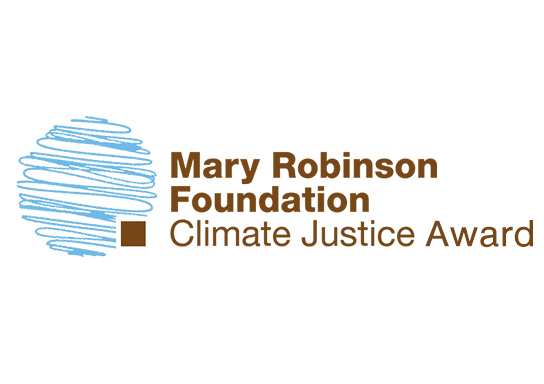[[[image-1 native]]]
Why the Mary Robinson Foundation Climate Justice Award?
Climate justice links human rights and development to achieve a human-centred approach, safeguarding the rights of the most vulnerable and sharing the burdens and benefits of climate change and its resolution equitably and fairly. Climate justice is informed by science, responds to science and acknowledges the need for equitable stewardship of the world’s resources.
One Young World Summits have consistently engaged in discussion and debate on what is arguably one of our greatest collective challenges: Climate Change.
Inspired by Mary Robinson attending the One Young World Summit 2014 as a Counsellor, as well as the relevance of the Climate Justice Principles to our community, One Young World wishes to encourage and empower young leaders to embrace Climate Justice Principles and take them into tangible action. We are calling on the young people around the world to submit tangible project ideas for working towards Climate Justice.
What is the Award?
One Young World will provide £5,000 to support the winning project. In addition we will provide a fully sponsored delegate place for the One Young World Summit 2016 where the winner will present their project to 1,300 delegates from 196 countries.
How do I enter?
The first step is to complete an online application before 29 February 2016.
The top four applicants will be shortlisted and invited to take part in a Google Hangout to discuss their project proposals with Mary Robinson and Kate Robertson who will then decide the winner of the award.
Application deadline 29 February 2016
Criteria for entry
To fulfill the Award entry requirements you must be aged 18 to 30 and your project should advance some of the following criteria:
- Directly addresses climate change – through financing, frontline services, education, communication, legal/policy change or a business solution
- Helps to protect a vulnerable community and/or creates an opportunity for a community disadvantaged by or at risk due to climate change
- Can be clearly associated with one or more of the seven principles of climate justice:
- Respect and protect human rights
- Support the right to development
- Share benefits and burdens equitably
- Ensure that decisions on Climate Change are participatory, transparent and accountable
- Highlight gender equality and equity
- Harness the transformative power of education for climate stewardship
- Use effective partnerships to secure Climate Justice
Additional assessment criteria that will be applied in awarding the Prize later on are:
- Ambition of the project – how impactful your project is
- Relevance – the project is related to its stated objective
- Community value – the project applies to a community/communities who are directly impacted by climate change or will be more adversely impacted in the future
Projects may work at global, local/sub-national or at national level.
Eligibility
To be eligible for the One Young World Climate Justice Prize you must be between the age of 18 and 30 and be available to participate in the One Young World Summit 2016 in Ottawa from 28 September to 1 October.
Inspiration
There is no set formula for an entry to the One Young World Climate Justice Prize: your project may educate a community about climate smart practices, it may be a business or a social enterprise, it might be a service offering from an existing business, or it can provide advocacy tools to a community fighting climate change. This list is not conclusive – your ideas are welcome. Please refer to the entry criteria to help you ensure your idea is on track.
There are many sources of inspiration and background reading that may help you to shape your Climate Justice idea. Here are a few sources to help you on your way:
Mary Robinson Foundation Climate Justice hosts a research database on climate justice and a series of case studies providing practical examples of how hunger, nutrition and climate justice are linked from the perspective of households and communities. These can be accessed here. Those of particular relevance are:
- Getting a seat at the table: Fisher folk empowerment for policy change in the Caribbean http://www.mrfcj.org/pdf/case-studies/2013-04-16-Caribbean.pdf
- Communicating seasonal forecasts to farmers in Kaffrine, Senegal for better agricultural management http://www.mrfcj.org/pdf/case-studies/2013-04-16-Senegal.pdf
- Less hunger, better health and more wealth: The benefits of knowledge sharing in Malawi’s Orange-Fleshed Sweet Potato project http://www.mrfcj.org/pdf/case-studies/2013-04-16-Malawi-OFSP.pdf
- The right to food security in a changing Arctic: Feeding My Family http://www.mrfcj.org/our-work/the-right-to-food-security-in-changing-arctic.html
Many Strong Voices was born at the climate change negotiations in Montreal, December 2005, out of a need for joint efforts to raise awareness about the effects of climate change in the Arctic and Small Island Developing States (SIDS), two of the world's most vulnerable regions. MSV works to develop community-driven comparative and integrated solutions on adapting to climate change. It undertakes practical, on-the-ground projects on adaptation in coastal communities in the Arctic and Small Island Developing States. In particular the Portraits of Resilience project is an example whereby young people have been afforded the opportunity to tell their personal stories of how climate change is affecting their lives. More information can be obtained here: http://www.manystrongvoices.org/.
Glasgow Caledonia University holds a repository for the collection and collation of researched data on climate justice here: http://www.gcu.ac.uk/climatejustice/.
The Joseph Rowntree Trust offers research conducted in the UK that may be of use to those wishing to research climate action that has a climate justice perspective:
- Socially just adaptation to climate change: http://www.jrf.org.uk/publications/socially-just-adaptation-climate-change
- Practical Action to Build Community Resilience: http://www.jrf.org.uk/publications/practical-action-build-community-resilience

